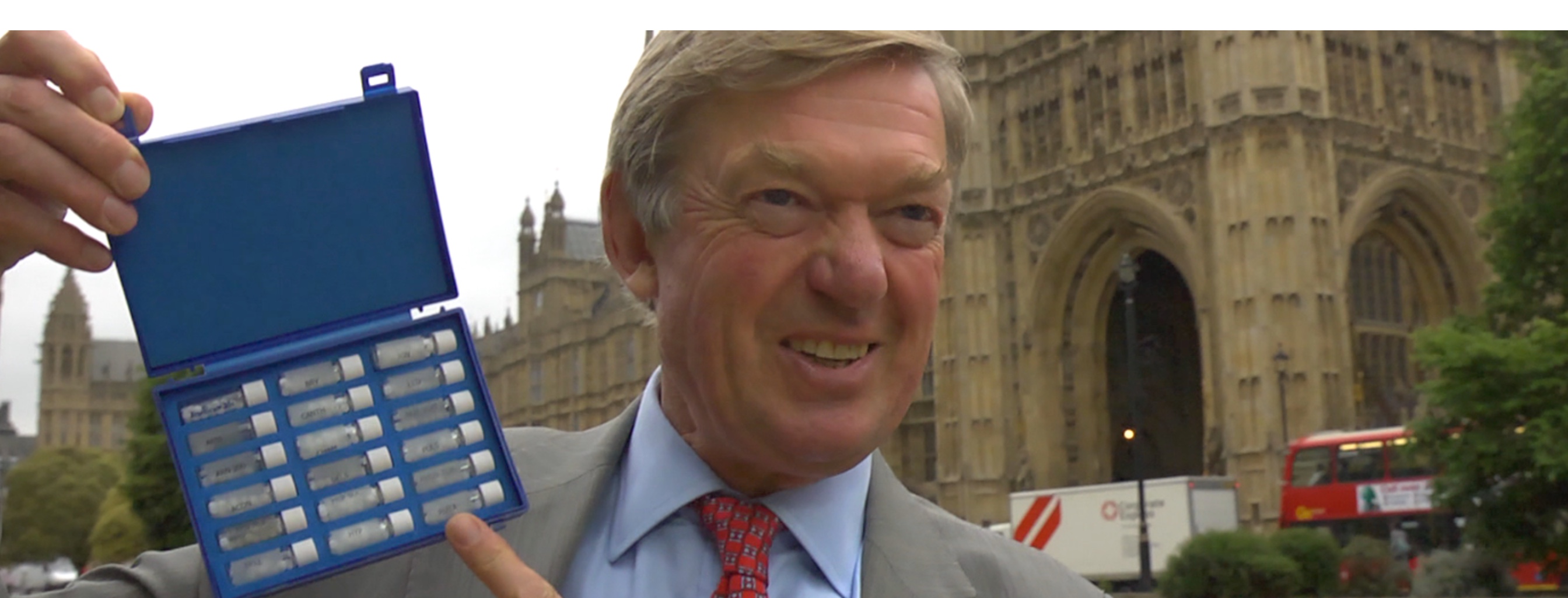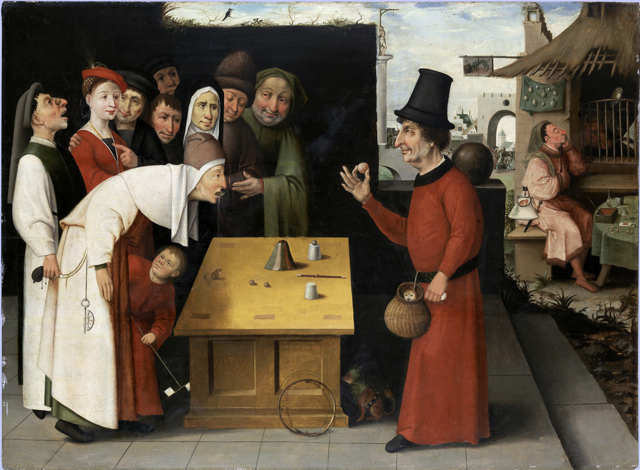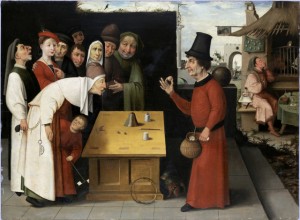Dutch Sceptics Have ‘Bogus’ Libel Decision Overturned On Human Rights Grounds.
 The Dutch sceptics group, Vereniging tegen de Kwakzalverij (VtdK – The Society against Quackery) have managed to overturn a important court ruling that was preventing them calling quacks quacks. In a remarkable case, that in many ways closely parallels the BCA vs. Simon Singh case in the UK, a judge has decided that using a narrow definition of the word ‘Quack’ that a previous ruling was forcing the group to defend in a libel case, was incompatible with Article 10 of the European Convention of Human Rights.
The Dutch sceptics group, Vereniging tegen de Kwakzalverij (VtdK – The Society against Quackery) have managed to overturn a important court ruling that was preventing them calling quacks quacks. In a remarkable case, that in many ways closely parallels the BCA vs. Simon Singh case in the UK, a judge has decided that using a narrow definition of the word ‘Quack’ that a previous ruling was forcing the group to defend in a libel case, was incompatible with Article 10 of the European Convention of Human Rights.
The Society against Quackery claims to be the world’s oldest sceptics group. Its first newsletter was published in 1881 (Google translation) and has campaigned ever since against the misleading claims of alternative medicine.
In 2000, their magazine published an article “Quacks of the 20th Century” that looked back over the last 100 years and wanted to ‘preserve the history’ of the characters that had dominated, in their view, the world of quackery. They published a score card of how they had arrived at the top twenty quacks and stated that this list was “not meant to belligerently settle scores” but provide ‘insight into the personality of the healers of this period”.
In publishing their top 20 list, the Society were quite careful to explicitly define what they meant by the word ‘quack’. They said, (Google translation)
‘Quackery is:
(a) any professional act and/or the extending of advice or assistance related to the state of health of either man or animal;
(b) which is not founded on contemporary and/or empirically tenable hypotheses and theories;
(c) which is actively propagated among the public (“over-promotion”);
(d) which has not been tested on efficacy and safety within the professional group;
(e) which is (usually) performed without consultation of fellow practitioners.’
Now, you may not agree with this definition. And that is fine. But it is important to note that this is what the Society explicitly said about the meaning of the word. The Society also made it quite clear about what they thought about the honesty of such people:
As has been made clear by the Society & co, being labelled a ‘quack’ does not in the least imply bad faith or fraud: in practice, it is hardly possible to establish this. Therefore, nominees on the “long list” need not feel they are accused of immoral behaviour; the only thing they are accused of is quackery and nothing else!
I quite agree with this. In my explorations with the Quackometer, I can say that one of my biggest discovered undertsandings is that there are very few people out there practicing alternative medicine that fit into a simple categorisation of ‘fraud’. Most people sincerely believe that what they practice is genuine and are sincerely trying to help people. They are not deliberately misleading people, they are just mistaken in their beliefs. And why they are mistaken is much more fascinating and insightful into human behaviour than mere trickery and con-artistry. And when I do suspect genuine fraud, it is impossible (bar a few exceptions) to prove that this is the case. As the Dutch Society make clear, “it is hardly possible to establish this”.
At number seven on the list was a doctor by the name of Maria Sickesz (Google translation) who claims to be a “doctor of Orthomanual Therapy”. Sickesz believes that she has “developed a unique method to correct misalignments of the spine and the pelvis. She pays attention to the individual misalignment of each vertebra and noticed that they followed specific patterns.”
Misalignments of the bones in the back can be responsible or add to all sorts of diseases according to her. She claims to be able to treat “syndromes such as lung and digestive disorders, problems with the menstrual cycle, ADHD, autism, multiple sclerosis, Parkinsonism”. According to the VtdK, she has claimed to be able to treat “anorexia, asthma, autism, bipolar disorder, dementia, depression, diarrhea, eczema, palpitations, high blood pressure, fever, stomach pain, menstrual complaints , migraine, neck pain, tinnitus, psychosomatic stomach, schizophrenia” all by manipulation and hammering of the spine. She says that “The connection between these seemingly unrelated conditions and the spine is that the nerves, which serve all areas of the body, can be irritated directly or indirectly by spinal disorders.”
Yes. Sickesz has developed hew own brand of chiropractic or osteopathy. Indeed, a paper by her describes her subluxation based theory of why children develop colic. It is pretty indistinguishable from the sort of nonsense promoted by British chiropractors.
Displaying what we now know to be a typical chiropractic response to criticism, she decided to sue the VtdK for calling her a quack. An initial ruling by a district court said that the Society had not acted unlawfully and rejected Sickesz’ claim to prohibit the society from calling her a quack. However, on appeal, this decision was overturned and the Society was told not to repeat the claim and to issue an apology in De Telegraaf, a popular daily newspaper. It would appear that the main reason was that a major Dutch dictionary, “Van Dale, Groot Woordenboek der Nederlandse Taal” described quackery as follows: “
Someone who applies useless remedies to cure some disease or other or claims knowledge of remedies for all kinds of diseases, and/or someone who offers such remedies for sale, usually with a lot of noise; – unqualified practitioner of medicine, (fig) someone who wants to take the public for a ride, syn. cheap swindler, fraud, trickster.
This is a far more negative definition that the one offered by the Society in their article and the court decided that it is this meaning that the ‘ordinary’ man would ascribe to their article despite the Society being explicit about what they meant.
The Society decided to appeal this decision as it had far wider implications than just this case. Indeed, it would make it very difficult to talk about quackery in the Netherlands at all if courts were to take it as fact that an accusation of quackery meant that the Society were calling someone a “cheap swindler, fraud [and] trickster.” Fortunately, at appeal last May, this decision was overturned by the Supreme Court of the Netherlands. A number of very interesting things were said.
The Society claimed they had a duty and a right to warn the public about medical treatments that claim to be effective but are not supported by science. They believed there was no scientific evidence to back up Sickesz’ claims. They claimed the treatments met with fierce criticism from academic circles and that the treatments could even be dangerous,
Five experts in the fields of neurology, internal medicine, lung diseases and psychiatry, when asked for their scientific opinion, said: ‘the answers not only show that there is not a jot of scientific backing in serious medical literature for the opinions of Sickesz, but also that experts cannot even imagine that OMM could have any efficacy for their professions.’ The Society & co also have concerns about the safety of the manipulations. They have placed Sickesz on the list not just because of her claims concerning neck and back complaints, but mainly because of her other claims.
The court looked at the case from the perspective of the European Convention on Human Rights. They had to balance Article 8 that gave Sickesz a right to personal privacy against Article 10 that gave the Society a right to free expression. The court had to decide between a “colliding of fundamental interests interests in determining what level of carefulness should be practiced in society towards one’s fellow man.”
The Supreme court found in favour of the Society against Quackery. The court decided that the definition of ‘quack’ must follow the Societies own definition if it is to protect its right to free expression. That an average reader might not have the same definition cannot be blamed on the Society. Furthermore, there was substantial important public interest in the publications of the Society and so the publication of the list with Sickesz name on it cannot be “unlawful or grievous towards her”.
No justice is done to this freedom when no attention is being paid to the content that the Society & co themselves have given to the term and the context in which the term is used. The [previous] court has also failed to take into account that the publication with the list of quacks comes from a society with a serious character and a serious aim and the circumstance that in the medical world a treatment is considered quackery when it is claimed that it can cure something while there is no scientific evidence to support this claim.
It was also noted that the publication did not say anything about Sickesz private life but only discussed aspects that were matters of public interest and should as a matter of principle be part of a public debate. As such, the court said that “there must be sufficient room for freedom of expression in situations like these”.
This freedom of expression was characterized by the European Convention of Human Rights as ‘one of the essential foundations of a democratic society and one of the basic conditions for its progress and for each individual’s self-fulfilment’ and consequently: ‘must be narrowly interpreted and the necessity for any restrictions must be convincingly established.’
This court hearing only overturns a decision by a previous court that the Society should defend itself on the basis of the dictionary definition rather than their own definition. My understanding is that the full case is yet to be heard.
What does this mean for the current British Chiropractic Association vs. Simon Singh case in the UK? I present this here simply as a parallel and a reflection on how other countries might view such cases. Simon Singh is in quite a different situation at the moment.
The Dutch case has very much depended on the court allowing decisions to be appealed. Simon has of yet no such luxury and must defend his article on the definition of the word ‘bogus’ handed to him by Justice Eady – and that definition is that ‘bogus’ implies dishonesty. As Simon made his own meaning of the word bogus quite clear in his article as referring to chiropractic’s lack of evidence, he has to defend his position on a basis that quite obviously he himself does not believe.
Simon also has currently no platform to defend his case on European Human Rights grounds. But it is worth noting that the laws considered by Dutch judges are also applicable in the UK. Whether, a similar conclusion can be come to in this British case I will leave to better qualified commentators although my amateurish perspective would suggest that Simon would have very similar grounds to appeal.
Simon Singh must decide this week how best to move forward either with an oral appeal or some other route. This decision will undoubtedly rest not just on the apparent injustice being done but also on the financial and emotional drain placed on Simon (Defending English libel law may cost a hundred times more than most European proceedings, plus Simon has to defend his article on his own.)
My own commentary would be this:
Science is so successful because of one central feature: its self correcting nature. Ideas in science get better over time. Ideas that do not match reality are discarded and those that do survive testing are refined and become more useful. The Dutch sceptics are in the fortunate situation they find themselves because the legal decisions so far have been subjected to several bouts of scrutiny and refinement. Everyone in the Netherlands should have confidence that those decisions have got better with each legal iteration.
Simon Singh has not been so fortunate. He has been refused permission to subject the current ‘bogus’ ruling to any scrutiny under an appeals process. He is currently subjected to the tyranny of the man on the Clapham omnibus where the meanings of the words he has written has been decided by one man who appears to believes he can have definitive and infallible insight into the mind of the ‘common man’. There is currently no mechanism to question that ruling and so Simon is being forced to defend his words in the terms of a definition that is quite arbitrary, at the extreme of possible interpretations and in contradiction with Simon’s own stated definition.
And even if Justice Eady’s is right (and many doubt it is), then what the Dutch decision shows us is that by forcing Simon to accept an opinion about quackery that Simon would himself believe to be ill informed and ignorant of the true nature of alternative medicine then he is being denied a legitimate right to free expression about an issue of important public health. The ordinary man on the Clapham omnibus may indeed view quackery as simple fraud, but it is vital for public health for people to appreciate that it may be a little more complicated than that. And laws that force Simon to accept this situation are fundamentally unjust and oppressive according to rights that are now enshrined in European law.
The more I look at how English libel law operates the more convinced I am that such laws are an anachronism. Born in an age where a gentleman needed his honour protected against the tittle-tattle of the popular press, they now serve as a source of oppression where the powerful, the wealthy, the corrupt and the vested interest can close down democratic discussion. We now live in an age where we are all publishers, not just the press. The law is out of step and if the BCA vs Singh case causes fresh thinking about how we mediate the various rights involved in free speech then a great good will have been done.
With thanks to Cees Renckens (pictured) of Vereniging tegen de Kwakzalverij and to Jo van Ringen for translating the court papers (my Dutch is limited to ordering a beer at the bar). I must add that the opinions and interpretations discussed are mine alone.








13 comments